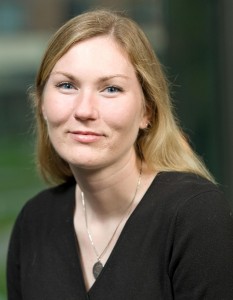
Karen Frey, assistant professor of Geography at Clark University, recently received Arctic Science research grants from the National Science Foundation (NSF) and the National Oceanic and Atmospheric Administration(NOAA).
The NSF grant is for a collaborative effort between the University of Maryland Center for Environmental Sciences, Clark University and the Woods Hole Oceanographic Institution. In her project, called “The distributed biological observatory: A change detection array in the Pacific Arctic sector,” Frey will lead field collections and analysis of particulate matter and optics to validate satellite observations. The award from the NSF is for $201,018 over five years.
The second grant is funded through NOAA. Over 18 months, Frey will receive $36,980 to work on a project titled “Satellite observations of sea ice variability and primary production in the Pacific sector of the Arctic Ocean.” She will compile a satellite-based time series of sea ice cover images, and integrate additional observations.
This project brings together a multidisciplinary group of Arctic scientists and Alaskan coastal community representatives to explore information from completed and current marine research in the Pacific Arctic region. By creating an overarching platform of collaboration between scientists and Alaska Arctic residents, the Synthesis of Arctic Research (SOAR) aims to increase scientific understanding of the biophysical environment, enhance capability to predict future conditions, and effectively transmit findings of the synthesis to local residents, resource managers, science societies, and the general public.
In addition to assisting the Bureau of Ocean Energy Management in its evaluation of oil and gas development in the Arctic, SOAR specifically focuses on understanding the relationships among oceanographic conditions, benthic organisms, lower trophic pelagic species and higher trophic species in the Pacific Arctic.
After earning a B.A. from the Department of Earth and Atmospheric Sciences from Cornell University and an M.A. and Ph.D. from the Department of Geography at the University of California, Los Angeles, Frey joined the Clark faculty in the Graduate School of Geography in fall 2007. Since arriving at Clark, Frey created The Polar Science Research Lab.
Frey’s research interests involve the combined use of field measurements, satellite remote sensing, and GIS to study large-scale linkages between land, atmosphere, ocean, and ice in polar environments. Her most recent work focuses on the hydrological and biogeochemical impacts of terrestrial permafrost degradation across Siberia and the biological and biogeochemical impacts of sea ice decline in polar shelf environments. Over the past decade, Frey has conducted field-based research in West and East Siberia, as well as in the Bering, Chukchi, and Beaufort Seas. She is currently the major research adviser for six Ph.D., M.A., and B.A. students, working on projects in Siberia, Alaska, West Antarctica, the Himalayas, and the Chukchi/Beaufort Seas.
Founded in 1887 in Worcester, Massachusetts, Clark University is a small, liberal arts-based research university addressing social and human imperatives on a global scale. Nationally renowned as a college that changes lives, Clark is emerging as a transformative force in higher education today. LEEP (Liberal Education and Effective Practice) is Clark’s pioneering model of education that combines a robust liberal arts curriculum with life-changing world and workplace experiences. Clark’s faculty and students work across boundaries to develop solutions to contemporary challenges in the areas of psychology, geography, management, urban education, Holocaust and genocide studies, environmental studies, and international development and social change. The Clark educational experience embodies the University’s motto: Challenge convention. Change our world.


